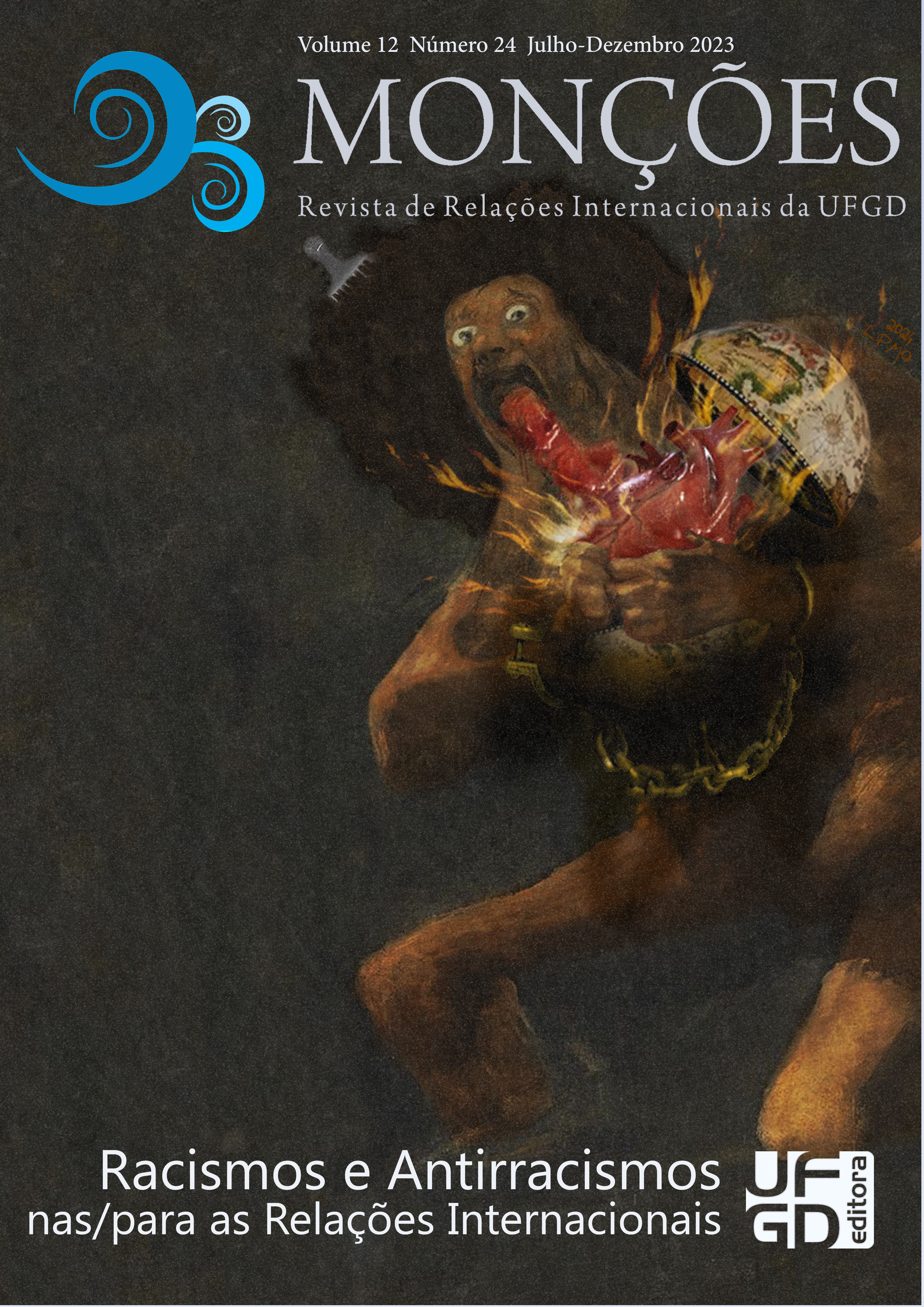Racismo Epistemológico: Insurreição e Inserção de Saberes na Hierarquia das Relações Internacionais
DOI:
https://doi.org/10.30612/rmufgd.v12i24.16659Palavras-chave:
Racismo epistemológico, Westfália, Relações InternacionaisResumo
Afirma-se recorrentemente que o marco histórico das relações internacionais – como objeto de estudo – se dá em 1648 com a Paz de Westfália ao se compreender a gênese dos Estados-nacionais modernos. Apesar de ser inegável o legado deixado pela lógica westfaliana e sua utilidade para o campo de estudos de Relações Internacionais (RI), a centralidade conferida a esse episódio configura um ponto de fratura na história das RI. Dividiu-se, a partir de então, o mundo entre os Estados que fizeram parte do tratado e os outros que foram excluídos dessa racionalidade de modernidade construída. Posto isso, este artigo está organizado em duas seções: na primeira parte se expõe como se deu o início do processo de formação hierárquica europeia/ocidental na disciplina. Por conseguinte, na segunda seção, são apresentadas as perspectivas conceituais de Ibn Khaldun e como suas contribuições atravessam as Relações Internacionais. Desse modo, chama-se atenção para a importância de um movimento de insurreição e inserção epistemológica com o fim de propiciar uma quebra na manutenção da hierarquia dos saberes científico-acadêmicos que fora edificada sob pressupostos racistas nas Relações Internacionais.
Downloads
Referências
ACHARYA, Amitav. Race and racism in the founding of the modern world order. International Affairs, v. 98, n. 1, p. 23-43, 2022. DOI: https://doi.org/10.1093/ia/iiab198
ANIEVAS, Alexander; MANCHANDA, Nivi; SHILLIAM, Robbie. Confronting the global colour line: An introduction. In: Race and racism in International Relations. Routledge, 2014. p. 1-15. DOI: https://doi.org/10.4324/9781315857299
ARRAES, Virgílio. GEHRE, Thiago. Introdução ao Estudos das Relações Internacionais. São Paulo: Saraiva, 2013.
ATAKA, Hiroaki; SHIBASAKI, Atsushi; YAMASHITA, Norihisa. The Constraints of Change: Deconstructing the Westphalian Narrative in Theory and Practice. 立命館国際研究, v. 34, p. 2, 2021
BHAMBRA, Gurminder K. Forget Westphalia. The Modern State Was Born from Colonialism. In: Why Is Mainstream International Relations Blind to Racism, 2020.
BLACHFORD, Kevin. From Thucydides to 1648: the “missing” years in IR and the missing voices in world history. International Studies Perspectives, v. 22, n. 4, p. 495-508, 2021. DOI: https://doi.org/10.1093/isp/ekaa012
BROWN, Garrett W.; MCLEAN, Iain; MCMILLAN, Alistair. The concise Oxford dictionary of politics and international relations. Oxford University Press, 2018. DOI: https://doi.org/10.1093/acref/9780199670840.001.0001
BURCHILL, Scott. Et al. Theories of International Relations. Palgrave MacMillan. 2005.
EVANS, Graham; NEWNHAM, Jeffrey. The Penguin dictionary of international relations. Penguin Group USA, 1998.
FOUCAULT, Michel. Em Defesa da Sociedade. Curso no Collège de France, 1975-1976. São Paulo: WMF Martins Fontes, 2010.
GROVOGUI, Siba N. Beyond Eurocentrism and Anarchy. Memories of International Order and Institutions. Nova York: Palgrave Macmillan, 2006. DOI: https://doi.org/10.1007/978-1-137-08396-8
HENDERSON, Errol A. Hidden in plain sight: racism in international relations theory. In: Race and Racism in International Relations. Routledge, 2014. p. 19-43.
KAYAOGLU, Turan. Westphalian Eurocentrism in international relations theory. International Studies Review, v. 12, n. 2, p. 193-217, 2010. DOI: https://doi.org/10.1111/j.1468-2486.2010.00928.x
LOHAUS, Mathis; WEMHEUER-VOGELAAR, Wiebke. Who publishes where? Exploring the geographic diversity of global IR journals. International Studies Review, v. 23, n. 3, p. 645-669, 2021. DOI: https://doi.org/10.1093/isr/viaa062
PASHA, Mustapha Kamal. Ibn Khaldun and world order. Innovation and Transformation in International Studies, p. 56-70, 1997. DOI: https://doi.org/10.1017/CBO9780511559006.006
PECEQUILO, Cristina S. Introdução às Relações Internacionais: temas, atores e visões. Petrópolis, RJ: Vozes, 2004.
SALAMA, Mohammad R. Islam, Orientalism and intellectual history: Modernity and the politics of exclusion since Ibn Khaldun. Bloomsbury Publishing, 2011. DOI: https://doi.org/10.5040/9780755608089
SARFATI, Gilberto. Teorias de Relações Internacionais. São Paulo: Saraiva, 2005.
SMITH, Karen. Eurocentrism in IR Is a Form of Intellectual Racism. In: Why Is Mainstream International Relations Blind to Racism, 2020.
SUNE, Engin. Non-Western International Relations Theory and Ibn Khaldun. All Azimuth: A Journal of Foreign Policy and Peace, v. 5, n. 1, p. 79-88, 2016. DOI: https://doi.org/10.20991/allazimuth.167344
TRIPATHI, Siddharth. International relations and the ‘Global South’: from epistemic hierarchies to dialogic encounters. Third World Quarterly, v. 42, n. 9, p. 2039-2054, 2021. DOI: https://doi.org/10.1080/01436597.2021.1924666
Downloads
Publicado
Como Citar
Edição
Seção
Licença
- Os autores e autoras mantêm os direitos autorais e concedem à revista o direito de primeira publicação, com o trabalho simultaneamente licenciado sob a Creative Commons Atribuição-NãoComercial-CompartilhaIgual 3.0 Brasil. que permite o compartilhamento do trabalho com reconhecimento da autoria e publicação inicial nesta revista.
- Autores e autoras têm autorização para assumir contratos adicionais separadamente, para distribuição não-exclusiva da versão do trabalho publicada nesta revista (ex.: publicar em repositório institucional ou como capítulo de livro), com reconhecimento de autoria e publicação inicial nesta revista.
- Autores e autoras têm permissão e são estimulados a publicar e distribuir seu trabalho online (ex.: em repositórios institucionais ou na sua página pessoal) a qualquer ponto antes ou durante o processo editorial, já que isso pode gerar alterações produtivas, bem como aumentar o impacto e a citação do trabalho publicado, porém invariavelmente com o reconhecimento de autoria e publicação inicial nesta revista.


